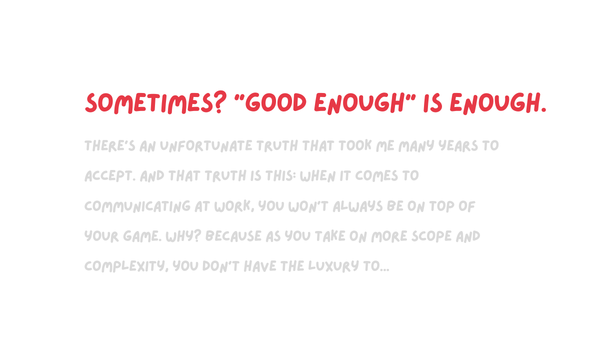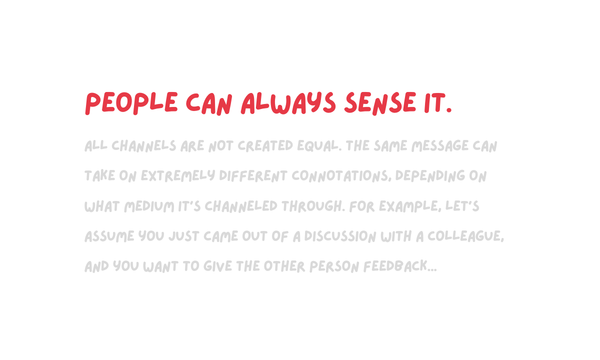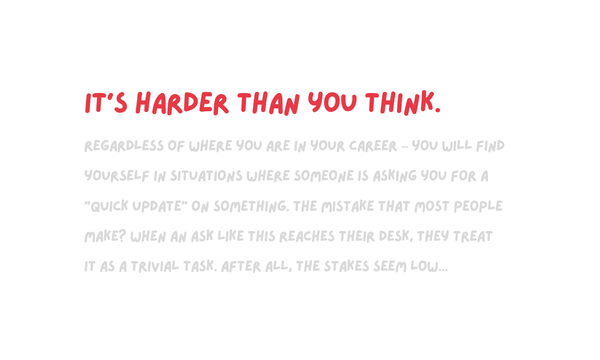😏 Is it selfish to want more visibility at work?

Duh, of course it is.
Which is why I’ll teach you 5 sneaky ways to do it.
💰 𝐒𝐞𝐧𝐝 𝐄𝐦𝐚𝐢𝐥𝐬 (𝐰𝐢𝐭𝐡 𝐕𝐚𝐥𝐮𝐞)
It might seem pretentious to send emails to everybody to talk about your work.
Sure, you can scoff at the notion of writing an email for a simple client visit.
Or you can also ask yourself:
- …Is the headline about how much the client loved you (and that you’re a superstar)?
- …Or is it anchored on client insights, which can help other people sell better?
Or imagine that you secured a big deal recently. Is the headline about…
- …How indispensable you are to the company?
- …Or is it about sharing what worked, so others can steal with pride with their accounts?
Even when it’s about you, it’s not about you.
📕 𝐖𝐫𝐢𝐭𝐞 𝐏𝐨𝐬𝐭-𝐌𝐨𝐫𝐭𝐞𝐦𝐬 (𝐚𝐧𝐝 𝐒𝐡𝐚𝐫𝐞)
Finished a big project? Great. But before you move on, ask yourself:
- …What did you learn that could benefit someone else doing something similar in the future?
- …What advice would you have for the org (and contribute to institutional knowledge)?
Oh, and look at that – visibility for yourself too.
🧠 𝐌𝐚𝐤𝐞 𝐎𝐯𝐞𝐫𝐬𝐡𝐚𝐫𝐢𝐧𝐠 𝐚 𝐑𝐞𝐟𝐥𝐞𝐱
It’s easy to share info with someone when they explicitly ask for it.
It’s hard to make it a reflex.
But if you constantly challenge yourself to think:
“What insight/context do I have that might be of value to this person?”
You’ll be pleasantly surprised at a couple outcomes...
The first is that you’ll start thinking like an exec. You'll start caring beyond your own remit.
Gaining that vantage point and mindset makes you incredibly valuable.
The second is that you help other people.
They might not use what you share immediately. But context builds up, and benefits can be reaped down the line.
And you’ll be seen as a valuable person to consult. Even on stuff with little to do with you.
Because you're helpful.
And somehow – more people now also know what you work on.
🔊 𝐀𝐬𝐤 𝐆𝐨𝐨𝐝 𝐐𝐮𝐞𝐬𝐭𝐢𝐨𝐧𝐬 𝐚𝐭 𝐓𝐨𝐰𝐧𝐡𝐚𝐥𝐥𝐬
And definitely don’t ask bad questions.
Good questions are useful to other people. They unlock insight from leadership. They reveal how execs make decisions.
Bad questions are lazy and selfish.
Lazy in that they take no thought (“What keeps you up at night?”).
Selfish in that they waste everybody’s precious time.
So ask really good questions. Create value for other people in the room.
And you’ll earn well-deserved visibility in the process.
🤝𝐎𝐟𝐟𝐞𝐫 𝐲𝐨𝐮𝐫 𝐧𝐞𝐭𝐰𝐨𝐫𝐤
Offer your network to other people generously.
It doesn’t have to be when someone’s looking for a job.
Just think about who might benefit from knowing whom. Wonderful things might happen when people connect.
And when it does – it’s because you kept other people’s interests top of mind.
Likewise – you’ll stay top of mind for them too.


